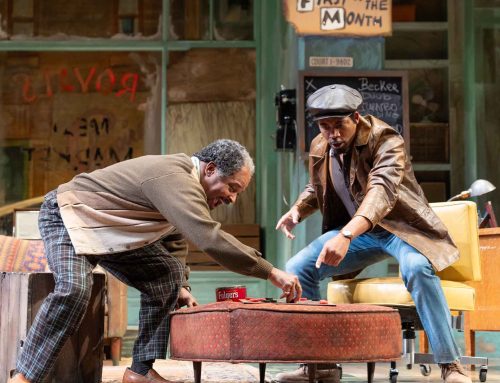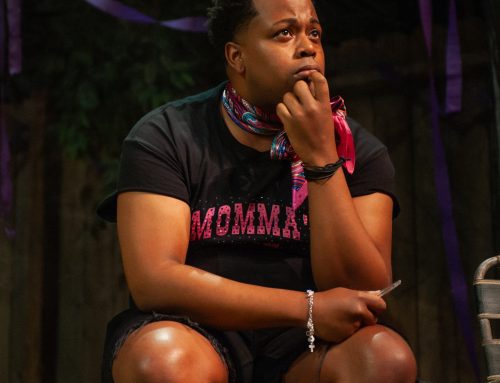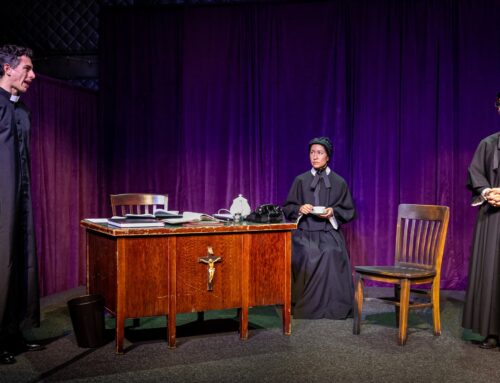at the Oregon Shakespeare Festival
 Party People
Party People
by UNIVERSES (Mildred Ruiz-Sapp, Steven Sapp, and William Ruiz/Ninja)
developed and directed by Liesl Tommy
The authors of this world-premiere, commissioned American Revolutions production told us in the post-performance audience talk-back that the Young Lords and the Black Panthers had effected their lives even though they had no knowledge of the groups themselves. One creator’s first job was in clinic started by the Young Lords, and another routinely benefited from social programs started by the Black Panthers. These racially-identified local community organizations truly changed the neighborhoods and residents’ lives. The artistic challenge for UNIVERSES, the authors said, was to tell the current generation about this legacy in a way which the young will hear.
The captivating response to the challenge is Party People, a performance piece that intimately dances, raps, and acts out the politics, the energy, the families, the fear, the conspiracy, the failure, and the success of the party people in a unfamiliar, non-white-bread format. The approach, the music, and execution stirred pasty-skinned, hip-hop hating, old fogy me. The brilliant moments excellently done took me in, especially because the presentation is not done in a comfortable routine style.
I feel defensive about liking the production so much because many of my friends find fault with the music, the repetitiveness of some of the themes, the unexplained stories, the missing call to specific action. Or something.
I thought the music was appropriate. I felt the thematic repetitions were more like classic leitmotifs instead of heavy-handed mistakes. And, the points unexplained and actions not outlined illustrate that some things are unknown and sometimes there is no one clear path for others to hand us.
I think my friends’ unease stems in part from their (and my) unfamiliarity with the way PP is thrown at us. As OSF’s Claudia Alick mused, with PP my friends and I are experiencing something like what kids of color feel when they walk into a classic evening of Shakespeare. Moreover, the performances of key players were so good that even if you aren’t down with the hipness, you can easily enjoy the spectacle.
PP plot is that two young men Jimmy (Ninja) and Panther Cub (Christopher Livingston) have interviewed aged radicals for a retrospective, and invite them all to an opening of the multi-media gallery show. At OSF we watch the party goers prepare for the evening, talk among themselves, and react as they encounter each other, some for the first time in 25 years.
The idealism, practicality, deception, betrayal, isolation, and cohesion come alive in differently-paced, non-linear vignettes all over the stage. These glimpses into the characters interrupt — or are interrupted by — larger-scale and jazz-scat-feeling dances, chants, and songs. Some individual stories ends with the character — and others from the past — coming together in a dance about the broader social movement.
PP is staged in the already intimate New Theater, and that closeness is taken to literal in-your-face extremes via the hand-held video camera of Panther Cub. Details of personal blemishes aren’t just metaphorical, they are projected in real-time on a back-wall-filling video bank. The “Gee, kids! Let’s do a play!” (now “video”) start to PP is disarmingly simple and traditional. The follow-on maze of perspectives and egos is messy and almost overwhelming. Could there be a better way of getting today’s 20-year-olds clued in on what the Panthers meant?
The musical and movement poetry are dazzling shows in themselves. The blocking to just get across the stage is an artistic ballet of human, camcorder, and emotion. The art is face-paced and it takes work for a traditional Anglo theater-goer to keep up and decode the messages.
The technical crafts contribute more than their fare share to the production. Clint Ramos (scenic design), ESosa (costumes), Daniel Barker (Music and Sound), and Pablo Molina (Projections) are obvious candidates for praise. The costumes are especially powerful in the way they nail their wearers’ life roles. From the striving-for-respect, near dowdiness of the dress clothes of Blue (G. Valmont Thomas) and wife Amira (Kimberly Scott) to the cross-generational phantasmagorical clown outfit worn by Jimmy trickster persona, the clothes make these men and women.
Jimmy and Panther Cub’s performances were key to getting the audience into the play, and the two young men are very up to the task. Ninja’s Jimmy switched from slacker to angry young man to nephew to absurdly powerful clown. The transitions felt natural even when they were surreal. Livingston was equally head-spinningly lithe in moving his moods to get the tale told. I also felt chemistry between the two which indicated a deep affinity, if not more. And, these men could move and rap! They worked their voices and bodies hard and effectively.
Nearly all of the other characters on stage were completely strong and skilled at getting their story out. Even smaller characters such as Tito — I heard “Tio”, but the playbill says it’s Tito” — played by Mateo Gomez and Marcus (Michael Elich) each had blazing moments in the spotlight, essential to understanding the history in front of us. Actors with larger roles, such as Thomas, Mildred Ruiz Sapp (as Helita) and Steven Sapp (as Omar) deserved each of their minutes on stage.
In one scene, four of the men dance in rhythm for seemingly forever as a story is told. Even the youngest, Livingston, was pouring with sweat in the effort to keep the beat of that storyline going. It is an apt symbolic moment for the whole production. The performers all worked hard and kept at it until their message got through to us. Got through our skins and not just through our minds.
PP is a world premiere ready for prime time. It will benefit from an editor/director who wasn’t also a co-creator. There are some wonderful moments — like the song that starts the second act — that will be more wonderful when they are shorter. PP needs a bit of work to leave us wanting more.
Ozdachs Rating
![]()





[…] art than legitimate theater. Rauch’s leap has worked for me in past years. In 2012, Party People, was one of my favorite productions of the season, and last year’s Unfortunates knocked […]